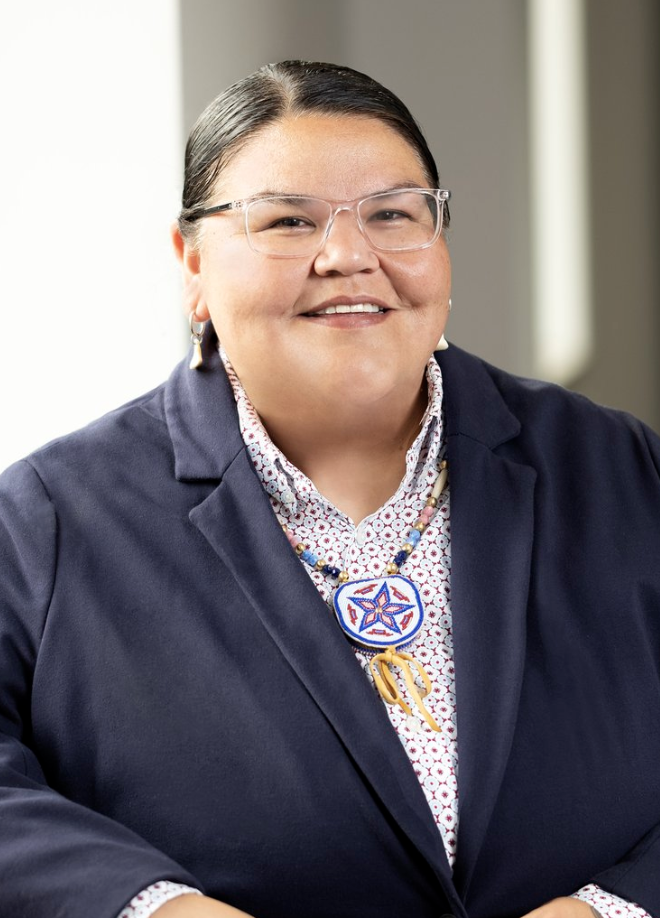
- Details
- By Native News Online Staff
Corinne Sams, a Member at Large of the Confederated Tribes of the Umatilla Indian Reservation (CTUIR) Board of Trustees, has been honored with the 2024 Ecotrust Indigenous Leadership Award.
“I work alongside and read about so many deserving Indigenous leaders and community members who are doing incredible work protecting sovereignty, culture, lands, first foods, water, economics, and so much more across Alaska, California, Canada, Oregon, and Washington,” Sams said in a press release. “This acknowledgment is absolutely something that makes my heart big, and I will forever be grateful for it.”
Recognized for her tireless work in protecting Indigenous rights, culture, and natural resources, Sams has long been a light of leadership within her tribe and beyond.
As a member of the CTUIR Board, Sams has contributed to key initiatives like restoring native fish, water conservation, and upholding treaty rights. She also chairs the Fish & Wildlife Commission and sits on the Law & Order Commission, helping drive legislation that protects tribal interests in various sectors, from agriculture to education.
One of Sams’s standout contributions to her community has been her work with youth, particularly young women. In 2023, she led a group of students to Willamette Falls, where they learned about the cultural importance of lamprey, a species integral to the region’s ecosystem and to tribal traditions.
As part of her work with the Columbia River Inter-Tribal Fish Commission (CRITFC), Sams led the way in the 2024 CRITFC Salmon Camp, a program designed to teach students from the CTUIR, Warm Springs Tribes, Yakama Nation, and Nez Perce Tribe about fisheries management, environmental stewardship, and the cultural significance of salmon.
Sams’ leadership also extended to a major milestone in 2023 when the Biden Administration signed the Resilient Columbia Basin Agreement (RCBA).
This achievement ensures that the U.S. government will work alongside the Six Sovereigns, a coalition of CRITFC tribes and the states of Washington and Oregon, to restore salmon and native fish to the Columbia Basin.
Sams played a key role in forging this partnership and advocating for tribal treaty obligations while addressing broader challenges related to climate and energy.
“We are proud to recognize Corinne Sams for her dedication to tribal youth, education, and cultural continuity,” Kara Briggs, Ecotrust Tribal Lands & Waters vice president said in a press release. “These commitments, along with her passion for protecting and defending tribal rights, were key components for her selection as one of Ecotrust’s 2024 Indigenous Leadership Award recipients.”
More Stories Like This
Michigan Tribes Tell Supreme Court: Don’t Bail Out EnbridgeAlaskans Raise More Than $1 Million For Communities Devastated by Typhoon Halong
A True American Tale: Indigenous Rights vs. Corporate Greed
In photos: Residents of Western Alaska Share Storm Damage of Ex-Typhoon Halong
Where the Buffalo Roam: Tribes Lead Bison Return for Food Sovereignty
Help us tell the stories that could save Native languages and food traditions
At a critical moment for Indian Country, Native News Online is embarking on our most ambitious reporting project yet: "Cultivating Culture," a three-year investigation into two forces shaping Native community survival—food sovereignty and language revitalization.
The devastating impact of COVID-19 accelerated the loss of Native elders and with them, irreplaceable cultural knowledge. Yet across tribal communities, innovative leaders are fighting back, reclaiming traditional food systems and breathing new life into Native languages. These aren't just cultural preservation efforts—they're powerful pathways to community health, healing, and resilience.
Our dedicated reporting team will spend three years documenting these stories through on-the-ground reporting in 18 tribal communities, producing over 200 in-depth stories, 18 podcast episodes, and multimedia content that amplifies Indigenous voices. We'll show policymakers, funders, and allies how cultural restoration directly impacts physical and mental wellness while celebrating successful models of sovereignty and self-determination.
This isn't corporate media parachuting into Indian Country for a quick story. This is sustained, relationship-based journalism by Native reporters who understand these communities. It's "Warrior Journalism"—fearless reporting that serves the 5.5 million readers who depend on us for news that mainstream media often ignores.
We need your help right now. While we've secured partial funding, we're still $450,000 short of our three-year budget. Our immediate goal is $25,000 this month to keep this critical work moving forward—funding reporter salaries, travel to remote communities, photography, and the deep reporting these stories deserve.
Every dollar directly supports Indigenous journalists telling Indigenous stories. Whether it's $5 or $50, your contribution ensures these vital narratives of resilience, innovation, and hope don't disappear into silence.
 The stakes couldn't be higher. Native languages are being lost at an alarming rate. Food insecurity plagues many tribal communities. But solutions are emerging, and these stories need to be told.
The stakes couldn't be higher. Native languages are being lost at an alarming rate. Food insecurity plagues many tribal communities. But solutions are emerging, and these stories need to be told.
Support independent Native journalism. Fund the stories that matter.
Levi Rickert (Potawatomi), Editor & Publisher

